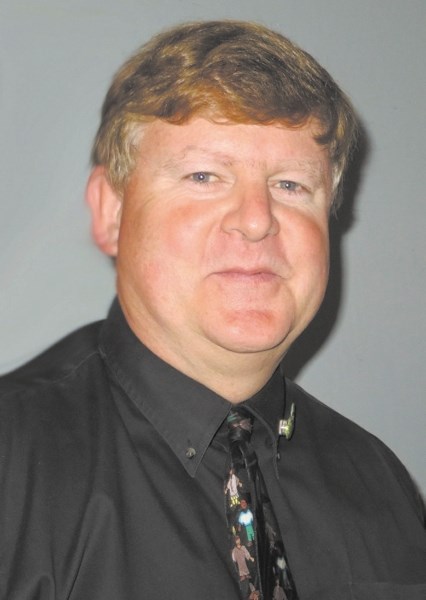Twitter, Skype, Facebook and blogging – tools that traditionally are removed from the classroom in favour of textbooks and notepads – are as essential to Springbank Middle School teacher Bill Belsey’s teaching repertoire as a pencil.
“Technology in and of itself is nothing, really. If you take a smartboard and a teacher only uses that smartboard like a whiteboard, well, then, what’s really changed?” he said. “But if you can use technology in ways that are thoughtful and insightful and can open doors for learning opportunities, and if you push past the glitz of technology, what’s really important is learning to think critically.”
Belsey, who has focused on integrating technology into his classroom over his 20-year teaching career, was recently awarded the 2015 Edna Dach Educator of the Year Award, presented by the Educational Technology Council of the Alberta Teachers’ Association.
“It’s an honour. You know, teachers don’t do what they do to receive awards,” he said.
“I’ve been using technology in my classroom for many, many years. It goes back quite a few years to the early 1980s, when I had the first computer in the North,” Belsey said, referring to his time teaching in Eskimo Point, N.W.T.
That first computer enabled Belsey to teach Inuit students a programming language called LOGO. As technology evolved, Belsey changed with it.
“I don’t think I could ever be accused of being a Luddite. I think I have that cred with my colleagues. (But) learning in the age of distraction, we now have the opposite problem,” he said. “(Before) I had one computer and I was teaching LOGO programming, (and now) we all have wireless access and kids have other devices that they’re using now.
“Now, the biggest challenge is being mindful. Just because we haven’t had (technology) doesn’t mean we shouldn’t use it.”
In the classroom, Belsey developed innovative ways to implement technology, and encouraged students to utilize new media platforms to present content.
Belsey registered a Twitter account, @coolclass, enabling his students to participate in trending discussions around the world and started a podcast where students completed traditional book reviews in a new format.
“One of my students did their book report and published it as a podcast,” he said. “I got an email from the author of the book and he said he had listened and said (the student) did a better job than The Globe and Mail did.”
Belsey has also cultivated an online resource since 2000 to prevent bullying at schools at bullying.org.
He said he coined the term “cyberbullying” on his website to describe what he had been witnessing on the web.
“This (was) new at the time. I thought this is bullying and it’s happening in cyberspace and it needs its own name. It’s also very different, so I wanted a different word to get people’s attention to say this is something that is happening to young people,” he said. “Most people when I travel now, wherever you go around the world, everyone knows what cyberbullying is.”
To Belsey, the implementation of technology into the classroom remains a “balance” – he requests students turn off their devices whenever someone in the classroom is speaking. But he remains convinced proper use of modern tools can support education.
“When kids are excited and engaged, that’s the thing I live for. Despite doing this work for a bunch of years now, I’m (just) as passionate about it,” he said. “For kids now, access to the Internet is like the air they breathe. We can’t choke that off. We need to embrace it.”
To learn more about what Belsey’s class is up to, visit coolclass.ca.




